The raw, wild Indonesian island of Sumba, in East Nusa Tenggara, is home to one of the world's last remaining megalithic cultures. The "pasola", an integral part of the local culture and religion, and a kind of war game, sees thousands of traditionally dressed people convene to witness horseback battles between two teams of men across February and March each year, ahead of the rice harvest.
Battles were once waged until enough blood was spilled on the fields to guarantee a bountiful harvest; the central authorities have in recent years banned steel spears they use wooden ones instead -- meaning deaths are now rare, but the violence is still a dramatic spectacle and the more blood spilt, the better the harvest is expected to be. The pasola is an echo from a past steeped in primal rituals, but the drama remains very much part of today's Sumba.
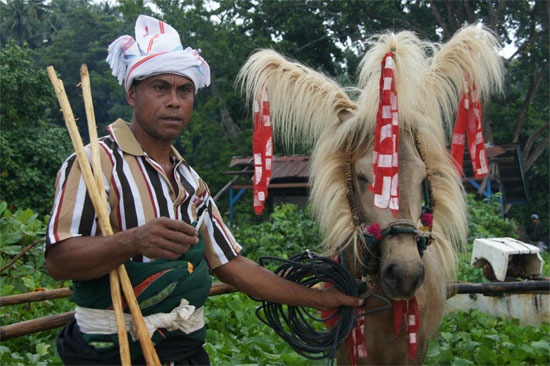
A proud rider and his beautifully decorated horse. (Photo Hay Haenen)
The term "pasola" is derived from the words pa, which means "game", and sola or hola, meaning "spear" or "stick". The battle, carried out in the intense heat of the sun, can go on for four or five hours, with the warriors determined to score as many hits as possible -- the higher their strike rate, the more highly they will be esteemed by their village.
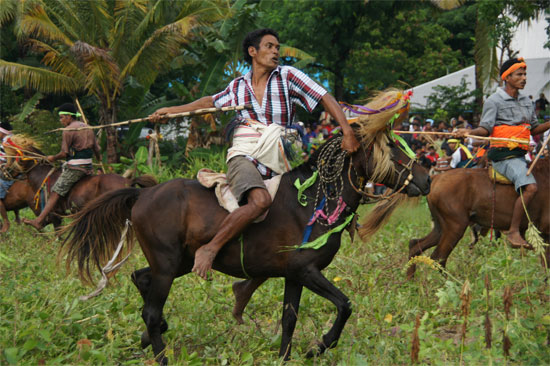
The spears are thrown with great force and precision. (Photo Hay Haenen)
The Pasola is performed in four different areas of west Sumba each year. Usually February sees it take place in the Lamboya and Kodi areas and in March it takes place in Wanokaka and Gaura. The actual dates of the events nowadays are revealed a few weeks beforehand by tribal elders and government officials but as a rough indication -- don't rely on this -- it's held very roughly eight or nine days after a full moon. While frustrating, the lack of an early announcement keeps big tour groups, who need to plan well in advance, away from the ritual, allowing it to retain a genuine atmosphere.
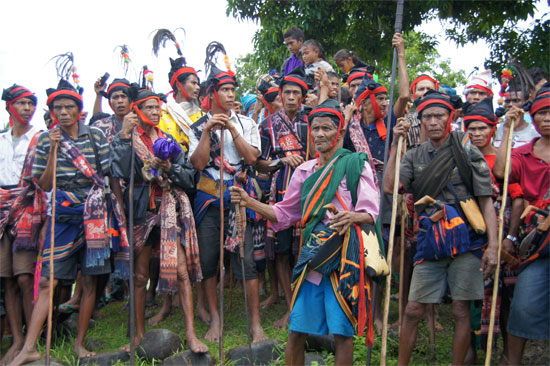
Priests gathered at the ceremony before the start of the Pasola. (Photo Hay Haenen)
I was lucky to see the Pasolas in Wanokaka and Kodi and they were among the most special and exciting events I've ever seen. A unique blend of culture and sports, the atmosphere is very lively -- sometimes aggressive -- with shouting people, thundering horse hooves and spears flying through the air. The crowd cheers whenever somebody is hit and sometimes riders fall from their horses. Although the wooden spears are no longer sharpened, serious injury is an integral part of the "game"; drawing blood during the Pasola is a necessary step in the cleansing and purification of the fields. The skilful riders ride bareback, rope halters in one hand, spears in the other. The best riders duck or can even catch their rivals' spears.
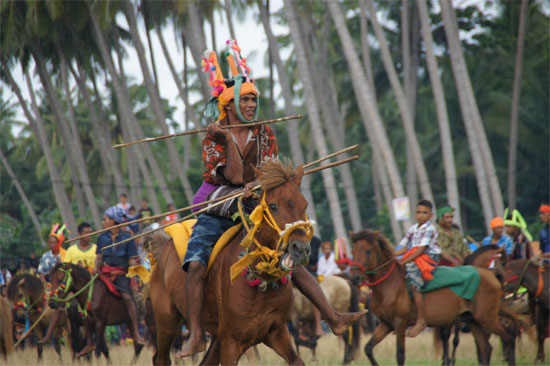
A rider attacks while the others are waiting for their turn. (Photo Hay Haenen)
Visiting a Pasola is not for the faint hearted. Its both exhilarating and frightening; usually the warriors suffer minor injuries to arms and legs, but death is possible. Just a couple of years ago, one rider died after being speared through the eye, while at the Kodi Pasola this year a rider was seriously injured in the eye, but survived. The spectators of course are at risk too and at the Kodi Pasola I attended one man not so far from me was hit by a spear.
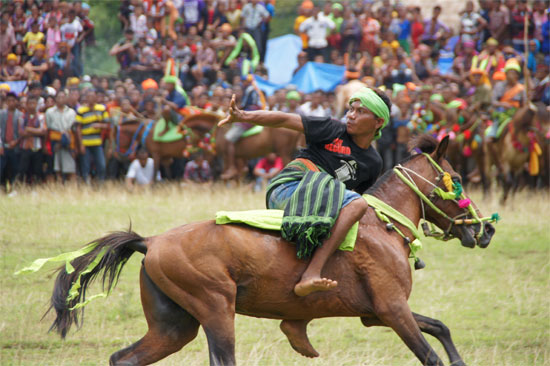
Bareback riders show their great skills. (Photo Hay Haenen)
If you're keen on seeing the Pasola, you'll want to base yourself in West Sumba. Waikabubak in general is the best option as its more or less central for all the Pasolas, although going to Kodi can still take up to two hours. Waikabubak also has some reasonable hotels and is easy to reach from Tambolaka airport.
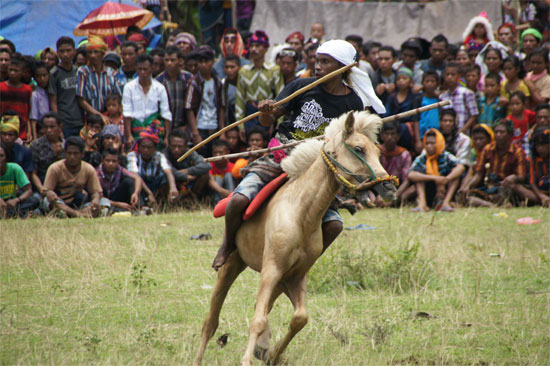
In full concentration for a coming attack. (Photo Hay Haenen)
How to experience Pasola, Sumba
To get from Tambolaka airport to Waikabubak a private car will take less than an hour and cost about 250,000 to 300,000 rupiah; sometimes there are shared minivans which charge 100,000 per person. No public buses leave from Tambolaka airport.
For getting around its best to ask a local tour operator to arrange a car with driver and guide, which should cost around 900,000 rupiah per day, going up as more people and longer distances are involved. An ojek will cost about 250,000 per day while just renting a motorbike should cost about 80,000 per day.
We'd recommend Yuliana Ledatara (yuli.sumba@gmail.com) or Sumba Adventure (sumbaadventure@yahoo.com) to help you out; they know the island and can tell you about the culture of Sumba and the traditions of the Pasola, so you will get a deeper look beyond the facade of the violence. They'll help you meet locals too, though it's also possible to do this if doing it under your own steam. I met several young people speaking quite good English, telling me proudly that their family was taking part in the Pasola and inviting me to their village afterwards.
But don't just come to Sumba for the Pasola. Sumba has an intriguing culture, beautiful beaches, some of the best surf spots in Indonesia and stunning, wild scenery. Garuda and Wings serve the Denpasar (Bali) to Tambolaka route daily, and Garuda also now flies between Labuan Bajo (Flores) and Tambolaka.